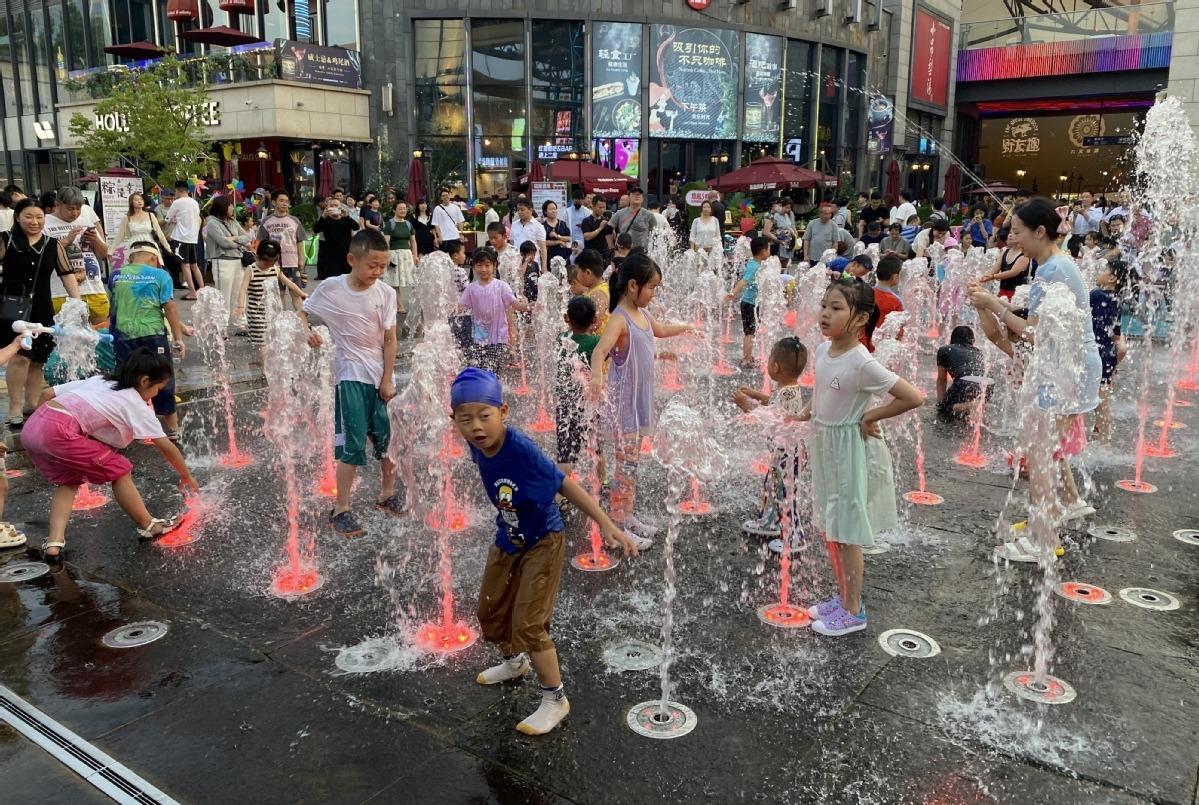 Children play at an interactive fountain in Haidian district of Beijing, June 22, 2023. (GENG FEIFEI / CHINA DAILY)
Children play at an interactive fountain in Haidian district of Beijing, June 22, 2023. (GENG FEIFEI / CHINA DAILY)
The scorching sun has pushed up the mercury in regional thermometers, with many parts of North China recording temperatures above 40 C on Thursday.
Beijing was one of these places, seeing temperatures rise above 40 C on Thursday, for the first time in June in 60 years. The capital warned of blistering hot weather throughout the weekend.
Early on Thursday, the city of nearly 22 million residents issued an orange alert, the second highest weather warning.
Neighboring Tianjin and cities in Hebei and Shandong provinces also witnessed record-breaking temperatures on Thursday.
China has a four-tier, color-coded weather warning system. Red is the most severe, followed by orange, yellow and blue.
An orange alert is issued when the maximum temperature exceeds 40 C in a single day or the maximum temperature remains above 37 C for two consecutive days.
The China Meteorological Administration advised Beijing residents to avoid outings in the afternoon and take precautions against heatstroke and dehydration.
The latest round of heat waves will also hit Inner Mongolia autonomous region and Xinjiang Uygur autonomous region, according to the administration.
Thursday marks the beginning of the three-day national Dragon Boat Festival holiday, when hundreds of thousands of Chinese are expected to crisscross the country for sightseeing or to visit relatives.
Home to a host of world cultural heritage sites such as the Palace Museum and the Great Wall, Beijing ranks among the top tourist draws during any public holiday.
Data published by Beijing Municipal Administration Center of Parks showed that despite the extreme temperatures, the city's sites received more than 300,000 visitors on Thursday. The top three destinations were the Summer Palace, the Temple of Heaven and the Beijing Zoo.
The Chinese Center for Disease Control and Prevention recently released a guide to help the public stay safe during the heat wave.
It said that excessive heat could cause a range of health issues such as heat cramps, exhaustion and even coma, with children, pregnant women and older adults being among the most vulnerable groups.
Outdoor workers such as street sweepers, construction workers and delivery drivers also face greater risks. They are advised to drink sufficient amounts of water and closely monitor their body temperatures, among other precautions.
Zhu Jihong, director of the emergency department of Peking University People's Hospital in Beijing, said long-term exposure to heat can cause discomfort such as dizziness.
"The key to avoiding danger is to find an escape from the hot environment immediately and cool down the body using whatever methods possible," he said in a video posted online. "Be it electric fans, air conditioners or an ice bag, anything cool works."
Sun Chenkun, a fitness trainer in Beijing, left the city on Thursday on a bullet train for Beidaihe, a beach resort in Qinhuangdao, Hebei province, where maximum temperatures are about 10 C lower than in the capital.
The 27-year-old had planned the three-day trip with a friend of his weeks in advance, primarily to attend the Aranya Theater Festival held there from June 15 to 25. In retrospect, the choice was a wise one, given the punishingly hot temperatures back home.
"The cool breeze at Beidaihe is a treat," he told China Daily.
Xinhua contributed to this story.



